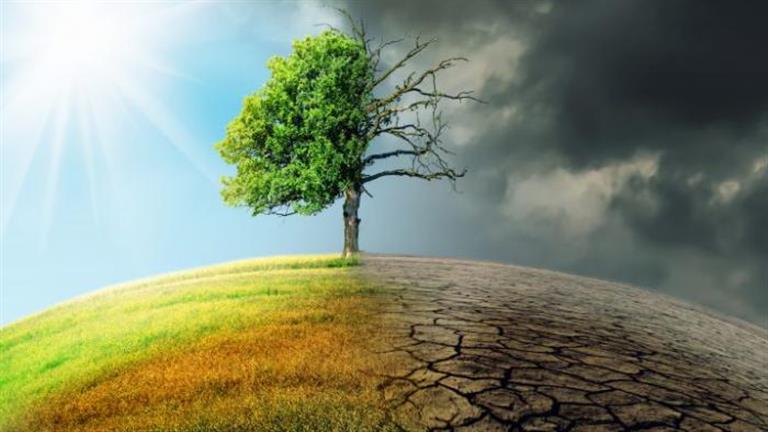Experts do not rule out that climate change – in the worst case – will lead to the extinction of humanity, as an international team wrote in an article in the Proceedings of the US National Academy of Sciences “PNAS” that so far very little is known about end-time scenarios and their possibilities.
Titled “The Climate Final Match: Researching Catastrophic Scenarios for Catastrophic Climate Change,” the authors of the article called for more prudent risk management and more research into the worst-case scenarios for global warming. The researchers believe that the world must now begin to prepare for end-times scenarios caused by climate change.
“There is ample evidence that climate change can reach catastrophic proportions,” wrote the scientists, including former and current directors of the German Potsdam Institute for Climate Impact Research, Hans-Joachim Schellnhuber and Johann Rockström. The researchers noted that despite 30 years of efforts to combat climate change, human-caused greenhouse gas emissions continued to rise. “Even excluding the worst-case scenario for climate change, the world is on track to experience a temperature increase of between 2.1 and 3.9 degrees Celsius by 2100,” the scientists wrote.
The scientists noted that the potential consequences of a 3°C temperature increase have not yet been sufficiently researched, with research so far focused on scenarios in which the consequences of climate change are moderate. “Facing a future of accelerating climate change without considering worst-case scenarios is naive risk management at best, and fatal folly at worst,” the researchers wrote.
Niclas Hone, a climate researcher at Wageningen University in the Netherlands, says the worst-case scenario for extinction is still “relatively far away”. The expert, who was not involved in the article, said: “There will be gradations before that happens…it is very likely that our countries and entire parts of other countries will no longer be habitable.”
In their article, the researchers touched on the breadth of areas where extreme heat will prevail – that is, an average annual temperature of more than 29 degrees Celsius. The researchers pointed out that about 30 million people are currently affected in the Sahara and the Gulf Coast. According to models prepared by the team, the population in such areas could reach about two billion people by 2070.
This illustrates how complex the effects of climate can be. “By 2070, rising temperatures and social and political consequences will directly affect two nuclear powers and seven high-security laboratories housing the most dangerous pathogens…There is a serious potential for catastrophic consequences,” said co-author Chi Xu of China’s Nanjing University.
So scientists are calling for more complex interrelationships to be included in future risk assessments, warning of a “risk chain” in which some of the consequences of climate change create more problems, such as the potential for rising temperatures and uninhabitable areas to lead to migration, social unrest and international conflict.
“We are now increasingly aware of the overlap and interactions between climate change and other areas such as biodiversity, the economy and food production… We have now reached a point where we can synthesize this knowledge,” says Daniela Jakob, director of the German Institute for Climate Services (GERICS), who was not involved in the article. thus generating important insights for the survival of the Earth system.”
The scientists wrote that the consequences of climate change will be very serious when the tipping point is reached, explaining that this point can be compared to a cup on a table: if it shifts towards the edge, nothing will happen initially until it reaches the tipping point where the fall occurs. For climate change, that means something like: the melting of a glacier has reached a point that can no longer be stopped. Once the ice areas melt, the ice will disappear, and this will lead to another tipping point.
According to the scientists, the Intergovernmental Panel on Climate Change (IPCC) has not yet adequately dealt with the potentially catastrophic consequences of climate change; None of the 14 special reports issued by the agency deal with extreme or catastrophic climate change. According to the authors of the article, these matters should be taken into account in the next report of the commission.
Jakob, who previously oversaw the preparation of a special report for the Intergovernmental Panel on Climate Change, also supported this demand, saying: “I think this is sound because it does two things: on the one hand, it will allow a special report to be able to find out the current state of knowledge On the subject, this will show whether we have enough knowledge or we have gaps. On the other hand, such an analysis will stimulate research.”
Jacob doubts whether such scenarios should be discussed outside the framework of scientific research. “I see this as a very early step,” she said. “It is not helpful here to engage in a dialogue with the public about end-times scenarios, if you do not yet know what they can do.” Exactly what happens, when it might happen, and what you need to do to prevent the worst from happening.”
On the other hand, Hoon believes that it is important to educate people about the worst-case scenarios, and said: “We have to clearly communicate what the risks are, and on the other hand say: It is still in our hands… We know how it works, we have the technologies and we know the political procedures. Taking action against change The climate is not expensive, it will be cheaper in the long run.”

